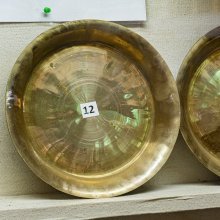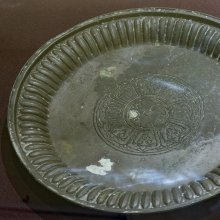Thala, Thāla, Thalā: 8 definitions
Introduction:
Thala means something in Hinduism, Sanskrit, Buddhism, Pali, Marathi, Jainism, Prakrit, Hindi, biology. If you want to know the exact meaning, history, etymology or English translation of this term then check out the descriptions on this page. Add your comment or reference to a book if you want to contribute to this summary article.
Alternative spellings of this word include Thaal.
Images (photo gallery)
Biology (plants and animals)
Source: Google Books: CRC World Dictionary (Regional names)Thala in Berber is the name of a plant defined with Acacia seyal in various botanical sources. This page contains potential references in Ayurveda, modern medicine, and other folk traditions or local practices It has the synonym Acacia stenocarpa A. Rich. (among others).
Example references for further research on medicinal uses or toxicity (see latin names for full list):
· Webbia (1972)
· Nature (1999)
· Memoirs of the New York Botanical Garden (1973)
· Bull. Int. Group for study of Mimosoideae (1977)
If you are looking for specific details regarding Thala, for example chemical composition, diet and recipes, pregnancy safety, health benefits, extract dosage, side effects, have a look at these references.

This sections includes definitions from the five kingdoms of living things: Animals, Plants, Fungi, Protists and Monera. It will include both the official binomial nomenclature (scientific names usually in Latin) as well as regional spellings and variants.
Languages of India and abroad
Pali-English dictionary
Source: BuddhaSasana: Concise Pali-English Dictionarythala : (nt.) land; dry ground. || thāla (m.; nt.) a plate; a dish.
Source: Sutta: The Pali Text Society's Pali-English DictionaryThāla, (nt.) (from thala orig. a flat dish) a plate, dish, vessel D. I, 74; J. I, 69; Miln. 282. Kaṃsa° a gong Miln. 62; Vism. 283 (in simile). See also thālī. (Page 308)
— or —
1) Thala, 2 (nt.) (prob. dialect. variant of tharu) the haft of a sword, the scabbard J. III, 221 (reading uncertain). (Page 308)
2) Thala, 1 (nt.) (Vedic sthala, to sthā, orig. standing place; cp. Gr. stέllw, stoλos; Ags. steall (place); also P. thaṇḍila) dry ground, viz. high, raised (opp. low) or solid, firm (opp. water) S. IV, 179. As plateau opp. to ninna (low lying place) at Sn. 30 (SnA 42=ukkūla); Dh. 98; It. 66=S. I, 100 (megho thalaṃ ninnañ ca pūreti); PvA. 29 (=unnatapadesa). As dry land, terra firma opp. to jala at Dh. 34; J. I, 107, 222; Pv IV. 121; PvA. 260. As firm, even ground or safe place at D. I, 234; Sn. 946. ‹-› Cp. J. III, 53; IV, 142; Vism. 185.
—gocara living on land J. II, 159;—ja sprung from land (opp. vārija Dh. 34 or udakarūha Vv 356=water-plant); referring to plants A. I, 35; J. I, 51; Vv 356 (=yodhikādikā VvA. 162); Miln. 281;—ṭṭha standing on firm ground A. II, 241;—patha a road by land (opp. jala° by water) J. I, 121; III, 188. (Page 308)

Pali is the language of the Tipiṭaka, which is the sacred canon of Theravāda Buddhism and contains much of the Buddha’s speech. Closeley related to Sanskrit, both languages are used interchangeably between religions.
Marathi-English dictionary
Source: DDSA: The Molesworth Marathi and English Dictionarythala (थल).—f (sthala) A share (of the lessor or lessée) in the produce of a field.
--- OR ---
thaḷa (थळ).—n (sthala) A plantation (as of sugarcane, betel, plantain, chilies &c. or gen.) 2 C A haunt or lurking-place of evil spirits. 3 A place or spot. Used restrictedly. 4 The portion of the produce due from the ardhēlī to the khōta, or from an under-tenant to the landlord. 5 The farm or the grounds collectively of one tenant or proprietor. 6 A stock or breed. thaḷa ghēṇēṃ-dēṇēṃ-nēmaṇēṃ-ṭharaviṇēṃ-māgaṇēṃ To accept, grant, appoint &c. an umpire to settle disputes of field-proprietorship or boundaries.
--- OR ---
thāḷa (थाळ).—f A pile of cakes or bits of cowdung, cocoanut-fibres &c., as kindled or arranged to be kindled. 2 Sense of heat (in the head, loins, back) from carrying a load; or (in the belly) from fasting or fever. v yē, uṭha, hō. 3 Burnedness or scorchedness (from close exposure to fire). 4 Sense of heat, weariness, and numbness (from long sitting, riding, or lying). v yē. Ex. mājhyā aṅgālā basūna &c. thāḷa ālī. 5 A stove or a hole in which milk is scalded; the rude stove on which ablution-water is warmed; any large and rude stove or fireplace. 6 Mess, slop, any mass of liquid nastiness. Ex. pōrānēṃ mutūna kāya thāḷa kēlī or bharavilī.
--- OR ---
thāḷā (थाळा).—m A metal vessel. It is flat, circular, and with a rising edge. Pr. jēvaṇārānēṃ māṇḍalā thāḷā paṇa vāḍhaṇārācā jāīnā cāḷā. 2 In weddings. This dish filled with trinkets and presented to the bride. thāḷā basaṇēṃ (pikācā-dhānyācā-śētācā-) To be ripened well and regularly--a corn-crop. 2 thāḷā vājaṇēṃ g. of s. To be consumed or exhausted--an article of provision, money &c.
Source: DDSA: The Aryabhusan school dictionary, Marathi-Englishthala (थल).—f A share (of the lessor or lessee) in the produce of a field.
--- OR ---
thaḷa (थळ).—n A plantation. A place or spot.
--- OR ---
thāḷa (थाळ).—f A pile of cakes of cow-dung, &c. as kindled. Sense of heat (in the belly) from fasting or fever. Sense of weariness and numbness (from long sitting &c.).
--- OR ---
thāḷā (थाळा).—m A metal vessel. thāḷā vājaṇēṃ Be consumed-an article of provision money, &c.
Marathi is an Indo-European language having over 70 million native speakers people in (predominantly) Maharashtra India. Marathi, like many other Indo-Aryan languages, evolved from early forms of Prakrit, which itself is a subset of Sanskrit, one of the most ancient languages of the world.
Sanskrit dictionary
Source: Cologne Digital Sanskrit Dictionaries: Edgerton Buddhist Hybrid Sanskrit DictionaryThala (थल).—(nt., = Pali id., MIndic for Sanskrit sthala), dry land: Mahāvastu iii.32.2,11 (v.l. sthala in both: prose).
Sanskrit, also spelled संस्कृतम् (saṃskṛtam), is an ancient language of India commonly seen as the grandmother of the Indo-European language family (even English!). Closely allied with Prakrit and Pali, Sanskrit is more exhaustive in both grammar and terms and has the most extensive collection of literature in the world, greatly surpassing its sister-languages Greek and Latin.
Hindi dictionary
Source: DDSA: A practical Hindi-English dictionary1) Ṭhālā (ठाला):—(a) idle; out of employment; unoccupied; (nm) scarcity; shortage.
2) Thala (थल) [Also spelled thal]:—(nm) land; place; ~[cara/cārī] terrestrial (animal); —[senā] the army; [thalīya] land, pertaining to the land.
3) Thāla (थाल) [Also spelled thaal]:—(nm) a large flat metallic plate slightly edged up; basin.
4) Thālā (थाला):—(nm) a basin (dug round a tree or plant for holding water).
...
Prakrit-English dictionary
Source: DDSA: Paia-sadda-mahannavo; a comprehensive Prakrit Hindi dictionary1) Thala (थल) in the Prakrit language is related to the Sanskrit word: Sthala.
2) Thāla (थाल) also relates to the Sanskrit word: Sthāla.
Prakrit is an ancient language closely associated with both Pali and Sanskrit. Jain literature is often composed in this language or sub-dialects, such as the Agamas and their commentaries which are written in Ardhamagadhi and Maharashtri Prakrit. The earliest extant texts can be dated to as early as the 4th century BCE although core portions might be older.
See also (Relevant definitions)
Starts with (+359): Tala, Tala-parrukaran, Tala-picaniyayam, Tala-vakaiottu, Talacamuttiram, Talacati, Talacayanam, Talacinkam, Talacutti, Talai, Talai-anaimantiram, Talai-arranal, Talai-atittukol, Talai-attipommai, Talai-ava-tarampannu, Talai-erutantam, Talai-ilaani, Talai-ilakuruvi, Talai-ilati, Talai-ileluttu.
Ends with (+269): Abhamgaviththala, Abhedyasthala, Achyutasthala, Acyutasthala, Adathala, Adhahsthala, Adhassthala, Adhasthala, Adisthala, Adrikritasthala, Agnisthala, Aikyasthala, Akayasthala, Akkathala, Ambatthala, Amgalimgasthala, Amgasthala, Ankasthala, Anthala, Apavadasthala.
Full-text (+257): Thali, Sthala, Thal, Thamvala, Thilathilanem, Thilathila, Thilathilita, Thalana, Raamudi thalam braalu, Gamvathala, Santhala, Kavarralam, Marulintam, Thalaka, Poosha thala, Thalaca, Upankatalam, Mattikathala, Punniyakshettiram, Stalam.
Relevant text
Search found 8 books and stories containing Thala, Thāla, Thaḷa, Thāḷa, Thāḷā, Thālā, Ṭhālā, Thalā; (plurals include: Thalas, Thālas, Thaḷas, Thāḷas, Thāḷās, Thālās, Ṭhālās, Thalās). You can also click to the full overview containing English textual excerpts. Below are direct links for the most relevant articles:
Karnatic Music - Its Philosophy < [January-February, 1929]
The Essentials of Karnatic music < [April – June, 2004]
The Essentials of Karnatic Music < [March-April, 1929]
Gemstones of the Good Dhamma (by Ven. S. Dhammika)
Ramayana of Valmiki (by Hari Prasad Shastri)
Chapter 66 - Jambavan appeals to Hanuman to sacrifice himself for the good of all < [Book 4 - Kishkindha-kanda]
Maha Prajnaparamita Sastra (by Gelongma Karma Migme Chödrön)
The Āmra-sūtra < [III. Recollection of the community (saṃgānusmṛti)]
The Skanda Purana (by G. V. Tagare)
Chapter 35 - Ruins of Dharmāraṇya Repaired < [Section 2 - Dharmāraṇya-khaṇḍa]
Chapter 39 - Different Families and Groups in Dharmāraṇya < [Section 2 - Dharmāraṇya-khaṇḍa]
The Buddha and His Teachings (by Narada Thera)
Related products




